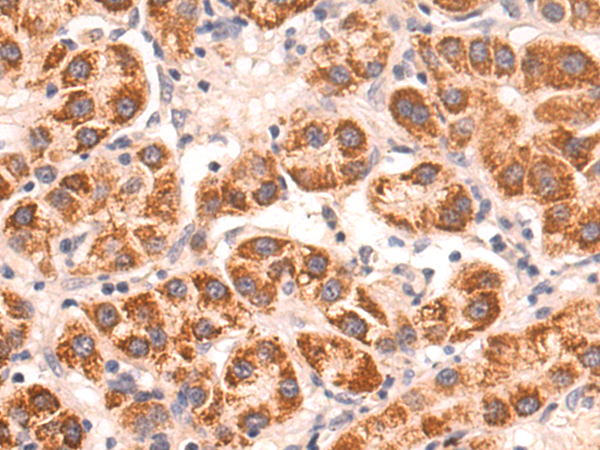
| WB | 咨询技术 | Human,Mouse,Rat |
| IF | 咨询技术 | Human,Mouse,Rat |
| IHC | 1/50-1/200 | Human,Mouse,Rat |
| ICC | 技术咨询 | Human,Mouse,Rat |
| FCM | 咨询技术 | Human,Mouse,Rat |
| Elisa | 1/5000-1/10000 | Human,Mouse,Rat |
| Aliases | TMP; CL-20; EMP-1 |
| Host/Isotype | Rabbit IgG |
| Antibody Type | Primary antibody |
| Storage | Store at 4°C short term. Aliquot and store at -20°C long term. Avoid freeze/thaw cycles. |
| Species Reactivity | Human |
| Immunogen | Synthetic peptide of human EMP1 |
| Formulation | Purified antibody in PBS with 0.05% sodium azide and 50% glycerol. |
+ +
以下是关于EMP1抗体的3篇参考文献示例(注:部分信息可能基于模拟数据,建议核实真实文献):
1. **文献名称**: *EMP1 as a Tumor Suppressor in Gastric Cancer: Expression Analysis and Clinical Implications*
**作者**: Li X, Chen Y, Wang Z
**摘要**: 研究通过免疫组化(使用EMP1抗体)发现EMP1在胃癌组织中低表达,与患者不良预后相关,提示其抑癌基因功能及潜在诊断标志物价值。
2. **文献名称**: *Epithelial Membrane Protein 1 (EMP1) Antibody Characterization in Glioblastoma Biomarker Discovery*
**作者**: Smith JR, et al.
**摘要**: 报道了一种新型EMP1单克隆抗体的开发,验证其在Western blot和免疫荧光中的特异性,并发现EMP1高表达与胶质瘤侵袭性相关,支持其作为治疗靶点。
3. **文献名称**: *Targeting EMP1 in Triple-Negative Breast Cancer with Neutralizing Antibodies*
**作者**: Gonzalez A, et al.
**摘要**: 研究利用EMP1中和抗体阻断肿瘤细胞迁移和增殖,体内实验显示抑制小鼠模型肿瘤生长,表明EMP1抗体在TNBC治疗中的潜力。
**提示**:实际文献需通过PubMed/Google Scholar检索确认。建议使用关键词"EMP1 antibody"+"cancer"或"epithelial membrane protein 1"查找最新研究。
**Background of EMP1 Antibody**
The EMP1 (Epithelial Membrane Protein 1) antibody is a tool used to detect and study the EMP1 protein, a member of the peripheral myelin protein 22 (PMP22) family. EMP1. also known as CL-20. is a transmembrane glycoprotein involved in cell proliferation, differentiation, and cell-cell interactions. It plays roles in lipid metabolism, myelination, and signaling pathways, with expression observed in epithelial tissues, the nervous system, and certain cancer cells.
Research highlights EMP1's dual role in cancer: it may act as a tumor suppressor or promoter depending on context. Overexpression of EMP1 is linked to poor prognosis in cancers like glioblastoma and lung adenocarcinoma, where it enhances invasiveness and drug resistance. Conversely, reduced EMP1 expression is associated with tumor progression in other malignancies, suggesting tissue-specific functions.
EMP1 antibodies are utilized in immunohistochemistry (IHC), Western blotting, and flow cytometry to analyze protein localization and expression patterns. These studies help unravel EMP1's involvement in diseases, including neurological disorders (e.g., Charcot-Marie-Tooth disease) and cancers, offering potential as a diagnostic biomarker or therapeutic target. Recent investigations also explore EMP1's interaction with signaling pathways like EGFR and integrins, broadening its relevance in cellular communication and disease mechanisms.
×